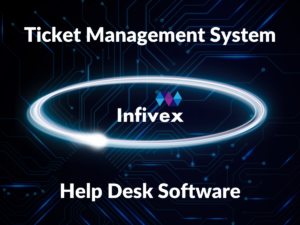Ticket Management System vs. Help Desk Software: Which is Right for Your Business?

I. Introduction
In today’s fast-paced business world, delivering exceptional customer support is crucial for maintaining customer satisfaction and loyalty. Two popular solutions that businesses often consider are ticket management systems and help desk software. This blog post aims to shed light on the distinctions between these two options, their functionalities, use cases, and the benefits they offer to different types of businesses.
II. Ticket Management Systems
A. Definition and Functionality
Ticket management systems are software solutions designed to streamline and organize customer support processes. These systems facilitate the creation, tracking, and resolution of customer support tickets. Core features include ticket tracking, automated workflows, and intelligent routing, ensuring that inquiries are efficiently addressed and assigned to the appropriate support agents.
B. Use Cases
Ticket management systems excel in scenarios where structured ticket workflows are essential. They prove invaluable for businesses receiving a high volume of customer inquiries or handling complex support issues. These systems enable support teams to manage and resolve tickets effectively, ensuring prompt and satisfactory resolutions for customers. Additionally, they provide comprehensive analytics that helps businesses measure performance, identify areas for improvement, and optimize their support operations.
C. Benefits for Businesses
Implementing a ticket management system offers several advantages for businesses. First and foremost, it enhances customer satisfaction by ensuring efficient and consistent support. With automated workflows and intelligent routing, businesses can minimize response times and maintain high-quality interactions with their customers. Furthermore, these systems offer customization options, allowing businesses to tailor workflows to their specific needs. Integration capabilities with other business tools and platforms also enable seamless information sharing, enhancing overall operational efficiency.
III. Help Desk Software
A. Definition and Functionality
Help desk software is a comprehensive customer support solution that goes beyond ticket management. It encompasses features like multi-channel communication, customer self-service portals, and knowledge base integration. Help desk software aims to provide a centralized platform for managing customer inquiries and support interactions.
B. Use Cases
Help desk software is particularly useful for businesses that need to manage customer inquiries across various channels, such as email, phone, live chat, and social media. It empowers businesses to offer self-service options, where customers can find answers to common questions or troubleshoot issues independently. Automation capabilities enable the streamlining of repetitive tasks, freeing up support agents’ time for more complex inquiries. Collaboration features within the software facilitate effective communication and coordination among support teams.
C. Benefits for Businesses
By implementing help desk software, businesses can deliver an enhanced customer experience. The multi-channel communication options ensure that customers can reach out through their preferred channels, improving accessibility and convenience. Self-service portals reduce dependency on support agents for routine inquiries, empowering customers to find solutions independently. Centralized ticket management and knowledge base integration foster better collaboration among support teams, leading to more efficient resolutions and improved customer satisfaction.
Moreover, help desk software provides real-time insights and analytics that enable businesses to identify recurring issues and areas for improvement. This allows for proactive measures to be taken to prevent customer problems and enhance the overall support experience. Additionally, the automation of routine tasks, such as ticket routing and prioritization, frees up support agents to focus on more complex and high-value tasks, increasing productivity and efficiency.
Furthermore, help desk software supports communication across departments, enabling seamless collaboration and improved workflow. This ensures that critical issues are addressed promptly and that customers receive a consistent experience across all touchpoints. By providing a comprehensive view of customer history and interactions, businesses can gain valuable insights into customer behavior and preferences, enabling them to deliver personalized and targeted support.
Help desk software can be integrated with other systems and tools, such as CRM, marketing automation, and analytics, providing businesses with a holistic view of customer interactions and enabling data-driven decision-making. This integration can also streamline operations and improve efficiency, reducing costs and increasing profitability for businesses.
In summary, help desk software provides significant benefits for businesses by improving the customer experience, increasing efficiency and productivity, fostering collaboration, and enabling data-driven decision-making.
IV. Choosing the Right Solution for Your Business
A. Evaluating Your Business Needs
To make an informed decision, it’s crucial to evaluate your specific business requirements. Consider factors such as the volume of tickets or inquiries you receive, the number of communication channels you support, the need for customization, and your future scalability needs.
B. Factors to Consider
When choosing between a Ticket Management vs HelpDesk software, several factors come into play. Evaluate the complexity of your support operations, the level of customer self-service you desire, the need for advanced analytics and reporting, and the scalability of the solution to accommodate future growth.
1. Complexity of support operations: If your support operations are complex and involve multiple teams, ticket management software may be a better fit as it allows for better organization and management of support requests.
2. Level of customer self-service: If you want to offer self-service options to your customers, help desk software may be a better option. It offers features such as knowledge base articles, FAQs, and chatbots to help customers find solutions to their problems before needing to contact support.
3. Advanced analytics and reporting: If you require detailed insights into your support operations, ticket management software may be a better option. It offers sophisticated analytics and reporting features to help you track performance, identify trends, and optimize your support processes.
4. Scalability: If you anticipate significant growth in the future, it’s important to consider the scalability of the solution you choose. Ticket management software typically offers more robust features and can scale better to handle increased demand.
Ultimately, the choice between Ticket Management vs HelpDesk software depends on your specific needs and goals. Carefully evaluate the features and capabilities of each option to determine which will best meet the needs of your organization.
C. Making the Decision

To make the best decision, involve relevant stakeholders in the evaluation process. Consider budget constraints, seek input from your support team, and explore demos or trial periods to assess the usability and compatibility of the solutions with your existing infrastructure. Carefully weigh the pros and cons of each option based on your business needs and priorities. Remember to consider the long-term benefits and potential for scalability.
V. Conclusion
In conclusion, choosing between a Ticket Management vs HelpDesk software requires a careful assessment of your business requirements and goals. Ticket management systems excel in structured ticket workflows, automation, and performance tracking, while help desk software offers multi-channel communication, self-service options, and centralized ticket management.
To make an informed decision, evaluate your unique needs, consider the features and benefits of each option, and weigh the pros and cons. Ultimately, choose the solution that best aligns with your customer support objectives and enables your business to deliver exceptional support experiences.
Take the next step in optimizing your customer support operations. Find the right solution that suits your business needs. Contact us today to explore the possibilities and schedule a demo!